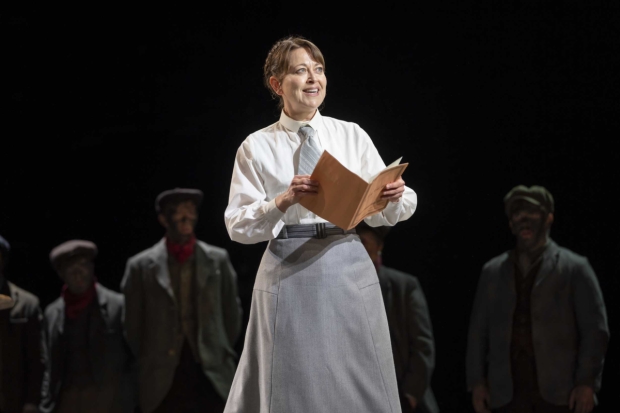The Corn is Green at the National Theatre – review

© Johan Persson
When the National announced its intention to revive Emlyn Williams' 1938 play The Corn is Green, it seemed an odd decision. The play, about a young miner who wins a scholarship to Oxford under the wings of his inspirational teacher Miss Moffat, hasn't been seen in London since 1985. On the basis of the 1945 film, starring Bette Davis, it seemed like a historic potboiler, without much to say to our more knowing times.
But this revival is more like a resuscitation. In Dominic Cooke's pitch perfect production, with Nicola Walker as Miss Moffat, the piece becomes a paean to the power of imagination itself, to the way that learning and the thought of centuries, can unlock possibility and hope. It is a triumph, an evening full of humour, feeling and inspiration.
Cooke's inspired intervention is to make Williams (played with brooding intensity by Gareth David-Lloyd) the narrator of his own story, turning the semi-autobiographical piece into a memory play as he steps out of a glamorous 1920s party to remember his past. Summoned by a male voice choir of miners, singing in rich-toned harmony, he begins to evoke his setting, reading the stage directions on a bare stage.
At first the action is stylised; Christopher Shutt's sound design provides the noises of objects being arranged. There is no scenery, no props, as a remote Welsh village, in the latter part of the nineteenth century, gets ready to welcome a new inhabitant. But once the purposeful Miss Moffat arrives and announces her intention to set up a school for the children of the local mining community, in the face of the opposition of the Squire who thinks the working class are better left uneducated, the action takes on increasing reality.
By the second half, designer Ultz has built a fully-realised parlour, where the school now thrives and where the brilliant Morgan Evans sits his Oxford scholarship exam. But the male-voice choir remain on stage providing, in Will Stuart's score, the emotional tug that underpins Williams' recollections. He is there too; his stage directions are less frequent, but he still intervenes in the action, watching the characters closely, deciding the course of their lives.

© Johan Persson
This framing device is a stroke of brilliance. It would be easy to write The Corn is Green off as preposterous without this physical reminder that it is at least in part true; Williams did escape the valleys to become a successful playwright, director and actor. It takes away the sentiment and replaces it with honesty. It also smooths over the play's slightly awkward episodic structure, allowing its scenes to flow.
Within this careful setting, Cooke's direction is a masterpiece of quiet concentration, and stillness. There's something watchful about the whole thing – because both the choir and Williams are studying the characters, the force of their attention compels the same behaviour from the audience.
What performances they are! Walker has found such success on TV recently in series such as Unforgotten and The Split, yet her ability to convey thought and feeling by the smallest of gestures – a little motion of the mouth, or a quick turn on her heel – is just as effective on stage. The scene where she sets out to seduce the pompous Squire (a wonderfully bristling Rufus Wright) into believing he is the talented Evans' natural patron is a humorous delight; her final scene with her protégé is a wonderful blend of pride and melancholy.
But she's good too on the bustling pride that nearly leads to her fall, and she's surrounded by carefully observed supporting characters from Alice Orr-Ewing's genteel Miss Ronberry, all fading hopes and constant checks in the mirror, to Jo McInnes's pragmatic Cockney housekeeper and Richard Lynch's sad-eyed schoolteacher, who are both "saved" but in different ways.
As Bessie, the disaffected teenager who nearly derails all Evans' hard work, Saffron Coomber finds just the right balance of sadness and calculation; you feel she, as much as Evans, needs to find a wall to climb over. And as Evans himself, Iwan Davies, makes a professional stage debut of great force, charting the character's progress from cheeky chancing, through disillusion at being treated as his teacher's little pit pony, to finding his true voice, and the language to express his thoughts, with a channelled passion.
It's that sense of voice, of education unlocking an ability to speak, that makes The Corn is Green such a powerful story. This production reveals that truth under the melodramatic gesturing. As Noel Coward said of cheap music, it is extraordinary how potent it is.












